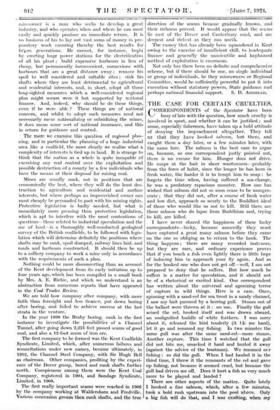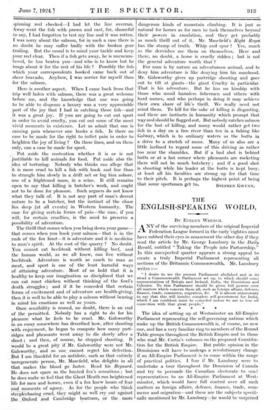THE CASE FOR CERTAIN CRUELTIES.
CORRESPONDENTS of the Spectator have been LI busy of late with the question, how much cruelty is involved in sport, and whether it can be justified ; and some, especially fishermen, have taken up a bold attitude of denying the impeachment altogr.ther. They tell us that they have hooked salmon, lost them, and caught them a day later, or a few minutes liter, - with the same lure. The salmon is the best case to argue on, because, as one correspondent justly pointed out, there is no excuse for him. Hunger does not, drive. He snaps at the bait in sheer wantonnesS—probably from the force of habit, since the longer he has been in fresh water, the harder it is to' tempt him to snap : he forgets the time when, having suffered a sea-change, he was a predatdry rapacious monster. How one has wished that salmon did not so soon cease to be unregen- eiate ; that they did not, after a course of fresh water and low diet, approach so nearly to the Buddhist ideal of those who would like us not to kill. Still there arc those salmon who do lapse from Buddhism and, trying to kill, are killed.
I have never shared the happiness of these lucky correspondents—lucky, because assuredly they must have captured a great many salmon before they came on the one so obliging as to return to the hook. The thing happens ; there are many recorded instances, but they are rare, and ordinary experience proves that if you touch a fish even lightly there is little hope of inducing him to approach your fly again. And as for the hooked one who does not get off—well, I am not prepared to deny that he suffers. But how much he suffers is a matter for speculation, and it should not be of a rhetorical or excited kind. One correspondent has written about the universal and agonizing terror of capture in wild things. Here is a case. Once, spinning with a sand-eel for sea trout in a sandy channel, I saw my bait pursued by a herring gull. Stones out of the ballast were thrown at it : no use. Finally the gull seized the eel, hooked itself and was drawn aboard, an undignified huddle of white feathers. - I was sorry about it, released the bird tenderly (it lit me hard), let it go and resumed my fishing. In two. minutes the same gull was after the same sand-eel—more stones. Another capture. This time I watched that the gull did not bite me, smacked it hard and hurled it away (against the advice of the boatman). We resumed our fishing : so did the gull. When I had hauled it in the third time, I threw it the remnants of the eel and gave up fishing, not because it seemed cruel, but because the gull had driven me off. Does it hurt a fish so very much more to be played and landed ?
There are other aspects of the matter. • Quite lately I hooked -a fine salmon; whiehi lifter a few minutes, took a bold rush upstream into the pool above. Only a big fish will do that, and I was exulting, when, my ;pinning reel checked—I had let the line overrun. Away went the fish with prawn and cast, for, shameful . to say, I had forgotten to test my line and it was rotten. I was sorry about the salmon, for in such a case there is no. doubt he may suffer badly with the broken gear -trailing.. But the moral is to mind your tackle and keep your reel clear. Then if a fish gets away, he is unencum- bered, he has beaten you—and who is. to know .but he brags about it for the rest of his life ? Possibly the fish which your correspondents hooked came back out of ,sheer bravado. Anyhow, I was sorrier for myself than for the salmon.
Here is another aspect. When I came back from that trip well laden with salmon, there was a great welcome before me, and the knowledge that one was going :to be able to dispense a luxury was a very appreciable part of the joy that I had in catching those fish—and it was a great joy., If you are going to cut out sport in order to avoid cruelty, you cut out some of the most vivid moments in existence. Let us admit that one is causing pain whenever one hooks a fish. Is there no case to be made for the right to inflict pain in order to heighten the joy of living ? - On these lines, and on these only, can a case be made for sport.
Put aside the contention whether it is or is not justifiable to kill animals for food. Put aside also the ,idea of torturing. Nobody who thinks can allege that it is more cruel to kill a fish with hook and line than to strangle him slowly in a drift net or lug him ashore, one of a frightened mass, in a seine. It still remains open to say that killing is butcher's work, and ought not to be done for pleasure. Such arguers do not know what they talk of. It is not any part of man's decent nature to be a butcher, but the instinct of the chase lies deep (at all events) in Western humanity. The case for giving certain forms of pain—the case, if you will, for certain cruelties, is the need to preserve a possibility of adventure.
The thrill that comes when you bring down your game— that comes when you hook your salmon—that is in the rush of the fox hunt—it is adventure and it is medicine to man's spirit. At the cost of the quarry ? No doubt. You cannot eat beefsteak without killing beef, and the human world, as we all know, can live without beefsteak. Adventure is worth as much to man as meat,, and sport is one of the least harmful ways of attaining adventure. Most of us hold that it is healthy to keep our imagination so disciplined that we can eat roast chicken without thinking of the fowl's death of ; and if it be conceded that certain forms of excitement and of adventure are health-giving, then it is well to be able to play a salmon without bearing in mind his emotions as well as yours.
Once sensibility is roused, no doubt, there is an end of the permitted. Nobody has a right to do for his pleasure what he feels to be cruel. Mr. Galsworthy in an essay somewhere has described how, after shooting with enjoyment, he began to compute how many part- ridges and pheasants went away to die slowly after a shoot ; and then, of course, he stopped shooting. It would be a great pity if Mr. Galsworthy were 'not Mr. Galsworthy, and so one _cannot regret his defection. .But I am thankful fOr an antidote, such as that entirely unregenerate person, Mr. Masefield, who delights in all that makes the blood go faster. Read his Reynard. He does not spare us the hunted fox's sensations ; but he does make us feel that the Ghost Heath run heightened life for men and horses, even if a fox knew hours of fear and, moments of agony. As for the people whO think steeplechasing cruel, they might as well cry .out against the _ Oxford and Cambridge boatrace, _Or the more dangerous kinds of mountain climbing. It is just as natural for horses as for men to task themselves beyond their powers in emulation, and they get probably as much thrill out of it. Mr. Masefield's Right- Royal has the stamp of truth. Whip and- spur ? Yes, much as the dervishes use them on themselves. Here and there, no doubt, a horse is cruelly ridden ; but is not the general adventure worth that ?
For man is by nature an adventurous animal, and to deny him adventure is like denying him his manhood. Mr. Galsworthy gives up partridge shooting and goes out to tilt at giants—the giant Cruelty in particular. That is his adventure. But he has no kinship with those who assail harmless fishermen and others with hard names, and who perhaps in doing it may achieve their own share of life's thrill. We really need not mind them. To kill for the sake of killing is disgusting, and there are instincts in humanity which prompt that way and should be flogged out. But nobody catches salmon for the lust of killing, and many would rather get two fish in a day on a free river than ten in a fishing like Galway, which is to ordinary waters as the butts in a drive to a stretch of moor. Many of us also are a little inclined to regard some of this driving as rather too near the shambles. But if a bad shot is behind butts or at a hot corner where pheasants are rocketing there will not be much butchery ; and if a good shot is shooting while his loader at the butts_ is kept busy, at least all his faculties are strung up for that time to their pitch. It is perhaps the highest point of being











































 Previous page
Previous page